The road from Huliaipole to Orikhiv is usually empty, a desolate stretch that few dare to travel because of the constant threat of danger. Only those with pressing reasons brave the journey. Just a few kilometres away lies the frontline, and the sound of artillery strikes is all too common. Despite this, the fields on either side of the road are a surprising sight. Sunflowers and wheat grow in neat rows, a testament to the local farmers’ dedication. Even in the heart of relentless fighting, the fields are cared for meticulously. The farmers there hold onto the belief that every piece of land should be put to use, no matter how perilous the conditions.
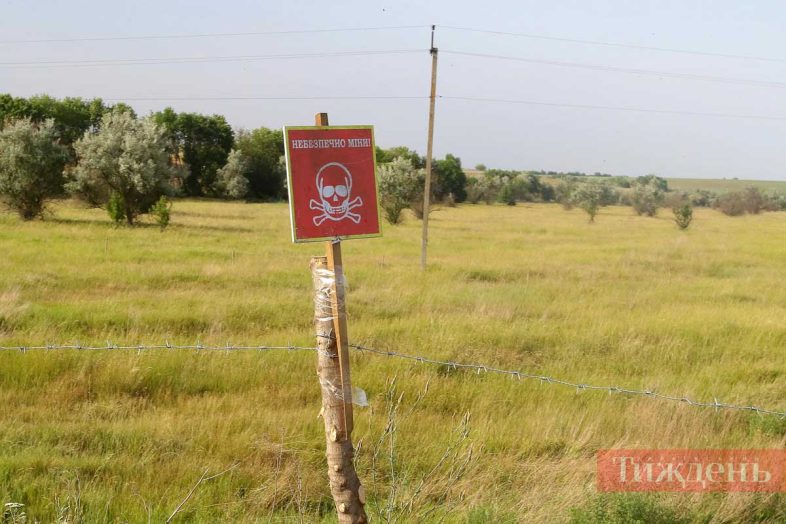
Photo: Roman Malko
We drive at full speed, pausing only to navigate around the fresh craters left by mines and shells. Our drone detector seldom stops its incessant beeping, a constant reminder of enemy UAVs hovering above us. It can distinguish between reconnaissance drones and the more sinister kamikaze ones. When a kamikaze drone is detected, we swiftly activate our electronic warfare systems and push the gas pedal to the floor.
In the distance, locals place concrete pyramids, known as “dragon’s teeth,” among the tall sunflowers. Nearby, a combine harvester methodically works through the wheat fields. The road is flanked by battered houses and abandoned cars, a testament to the ongoing conflict. Yet, calling these areas deserted would be misleading. While some residents have fled, many remain, determined to continue their lives amidst the chaos. Some wave cheerfully as military vehicles pass by, offering a rare moment of normalcy, while others watch silently, their faces etched with resilience.
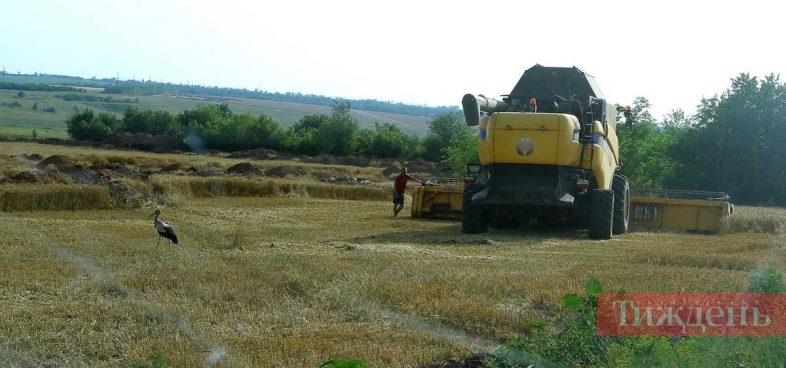
Photo: Roman Malko
Cossack Orikhiv greets us with a landscape of devastation. By May 2023, local authorities reported that shelling had destroyed 80% of the town’s buildings. The additional damage from cluster munitions used by the enemy is even harder to quantify. During last year’s ill-fated counteroffensive to the south, our primary forces, tasked with breaching the front lines, were concentrated in Orikhiv and its surroundings. Consequently, the town endured relentless shelling and bombing throughout the summer. While it’s likely that no building in Orikhiv remains undamaged, the town’s resilient residents continue to live there, and it is to them that we are headed.
Orikhiv is thought to have been founded by Cossacks fleeing the destruction of the Zaporizhian Sich by Russian Empress Catherine II in 1775. However, its origins stretch further back. Legend has it that Cossack Lisko established a winter hut on the right bank of the Kinska River long before this. Over time, settlers from Poltava, Chernihiv, and across Zaporizhzhia, along with Mennonite colonists from Germany, moved to the area. Orikhiv thrived, expanding rapidly and becoming the first town in what is now Zaporizhzhia Oblast to achieve city status. The town’s Cossack spirit has endured through the ages, so it is fitting that, during the Ukrainian War of Liberation in the early 20th century, Orikhiv emerged as a hub of the Makhno resistance movement. Today, despite ongoing attempts by Russian invaders since the spring of 2022, Orikhiv has resisted occupation and remains steadfast in its defence.
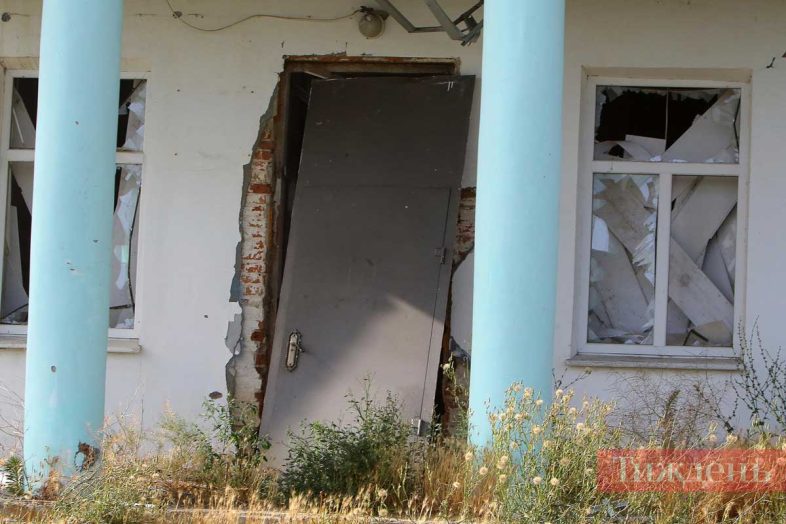
Photo: Roman Malko
Before the war, Orikhiv had a population of 14,000. Now, local estimates suggest fewer than a thousand remain—around eight hundred. “On our street, apart from my husband and me, there’s just an elderly couple living here,” says Aunt Taya, a longtime resident. “There’s also one young man who comes and goes; he has a farm in nearby Preobrazhenka.” Since last spring, Taya has been distributing humanitarian aid in her area, which has made her familiar with everyone. She took on this role after their local district representative was injured when a shell hit his house directly, forcing him to leave the city. “I used to collect aid for the whole street. There were more than 30 people then. Now, there are seven in my area: six from here and one elderly woman from a nearby street. There were a few more people there, but she asked to join us. When things settle down, people do come back: they plant their gardens, then leave, return to tend them, and handle pests.”
During the height of the fighting in the area, the couple was forced to take refuge in their basement. They moved their beds down there and set up a stove to stay warm. “Things eased a bit in the autumn when the shelling stopped,” Aunt Taya explains. “Since then, we’ve rarely had to use the basement. My husband sleeps in the shed, and I stay in the house. If the noise gets too intense, we run to the basement. That’s our routine.”
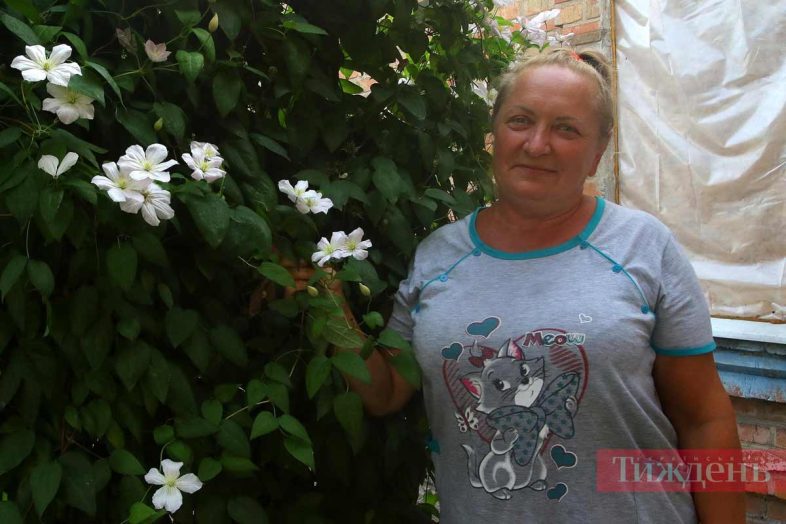
Orikhiv is currently without gas and electricity. To catch a signal, Taya scales a tall ladder leaning against her house. In the heat of summer, when she needs to water her garden, her husband turns on the generator to pump water from the well. Despite the harsh conditions, Taya’s garden stands out. On a modest plot of land adjacent to her home, she grows a variety of crops, maintaining meticulous care over her beds. “We covered the tomatoes to protect them from the intense heat,” she explains, pointing out her garden. “The garlic will be ready for harvest after the holidays. However, the potatoes didn’t fare well. Although we thought we were providing enough water, the yield was disappointing—more like peas than potatoes.”
Taya says her family has enough food for now. “We get humanitarian aid, and the soldiers always bring some extras,” she notes. The “soldiers” are from the “Volyn” battalion of the Ukrainian Volunteer Army, who were staying in a nearby house last summer during the counter-offensive.
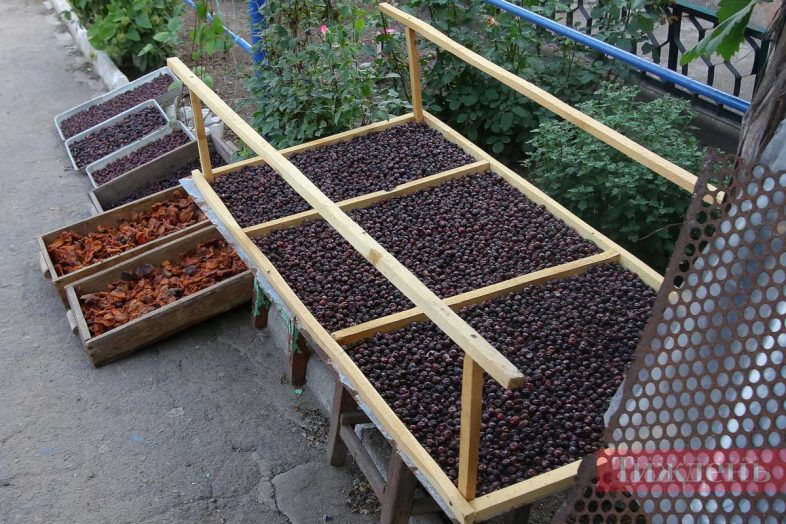
Photo: Roman Malko
Even though Orikhiv has seen a lot of destruction, some essential services are still running. “Two shops are open, the police are here, and the military administration is functioning,” Taya says. “The small market is starting up again, with locals selling veggies, groceries, and fish. Ukrposhta is still up and running, too; the staff there are doing a great job.”
For anyone needing to travel, there are minivans to Zaporizhzhia, but getting to them can be tricky due to obstacles along the way.
In a city stripped of gas, electricity, and largely reduced to ruins, it might seem like there’s little to do. But for residents, the tasks are endless. “You might head out in the morning and not return until evening,” Taya explains, pointing to a spread of dried cherries. “Between working in the garden, tending to the rabbits, and fixing windows blown out by explosions at neighbors’ homes, there’s always something to keep you busy. I even find time to plant flowers wherever I can. There’s never a dull moment.”
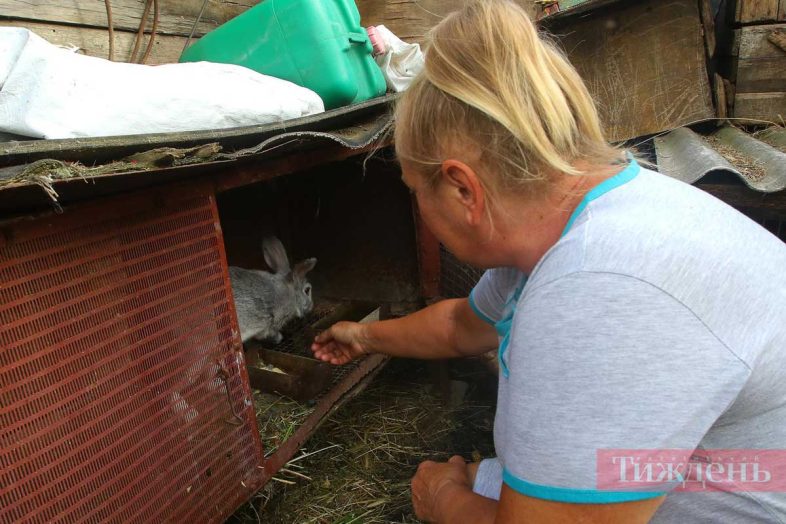
Photo: Roman Malko
“Why didn’t you leave? It’s dangerous here, with missiles potentially striking at any moment,” I ask.
“How can I put it?” the woman replies. “I want to stay home. Why should I have to find somewhere else to live because of these damn Russians? I don’t want to. I don’t want to go anywhere. So many of my friends and acquaintances have left, and nearly all of them say, ‘I wish I could go home; it’s terrible here.’ I don’t want to be tormented by nostalgia. I’m home. Every flower here seems to smile at me. I go outside, chat with the tree, talk to the dog. We feel needed here. There are cats and dogs left behind that nobody wants. I feed them all. This one here,” she points out, “I used to have a dachshund, but it died. The one by the gate came to us after people left their house and decided to stay. I feed him. There’s another one on that street. Some dogs come by to eat, while others stay in the yards. I go out to feed them. And then there are the boys who moved in nearby—they’ve become like my own children. I love them all so much. My husband asks, ‘How do you remember everyone, not just their callsigns but also their names?’ They don’t even know each other’s names, but I do.”
As we talk, distant explosions echo outside the city—one, then another, then a third.
“When it happens frequently, you get used to it,” says Aunt Taya. “I never imagined it would be like this. When it first started, I couldn’t believe it. A family friend from Kyiv called me at six in the morning while I was still asleep. He said, ‘Taya, we’re at war.’ I thought he must have had a nightmare and told him to go back to sleep. But he insisted, ‘We have tanks.’ That’s when I sat up, completely stunned. I couldn’t grasp what was happening or why.”
The Russians never managed to enter Orikhiv. They were stopped a few kilometres south of the city, but Orikhiv endured constant shelling. Taya recalls that when she realized the advancing forces might overrun her town, “a deep, unexpected hatred surged within me—hatred I didn’t even know I had.”
She began supporting the territorial defence forces stationed around the city. “We supplied them with food and tea since they initially had nothing. We gathered tents from wherever we could, provided inflatable mattresses, and even washed their clothes. That winter was particularly rainy, and the guys were often soaked through. At that time, we still had electricity, so a friend of mine—who later left because her young children were frightened—washed their clothes with a machine and dried them on the radiators. When the forces pushed the Russians back on the Kharkiv front, it was an incredibly euphoric moment. Our guys did great!”
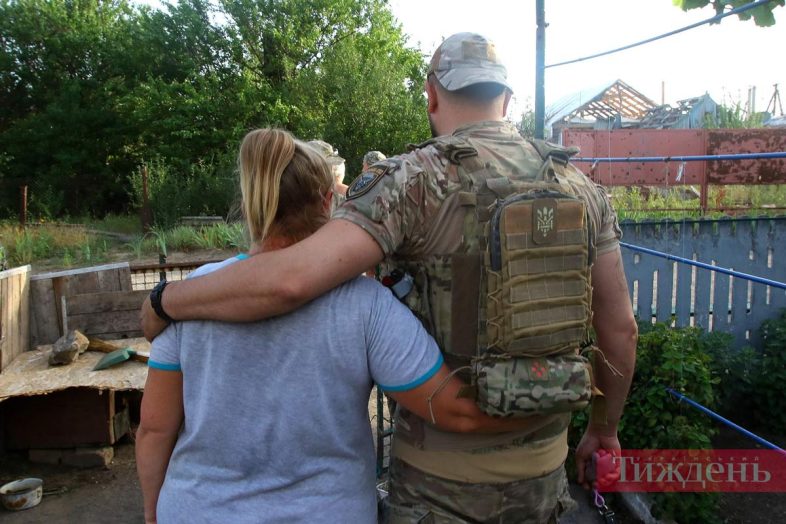
Photo: Roman Malko
Taya is deeply hurt by the way people like her, who stayed and faced all the challenges at home, are called “waiters”—as if they’re just sitting around. “A friend of mine said she met someone from our street who described us as ‘Oh, those Orikhiv people, just sitting there, demanding everything—light, water, always waiting.’ It stings so much to hear that. I’ve been here for years and still believe there are more good people than bad. I can’t imagine we have anyone like that in our circle. I just don’t want to believe it.”
Once the war is over and Ukraine reclaims its territories, Taya dreams of hitting the beach. “I really can’t wait,” she says with a smile. “And I want to learn to roller-skate—it’s been a dream of mine for ages. If you’re ever around, come by,” she adds, giving everyone a warm hug as she says goodbye. “Come for the pancakes. I’ll be waiting!”

